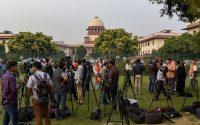$100 Website Offer
Get your personal website + domain for just $100.
Limited Time Offer!
Claim Your Website NowSupreme Court says Article 32 important, integral to Constitution
Source:-https://www.indialegallive.com
The Supreme Court in a reportable judgment on December 3 has observed that Article 32 of the Constitution of India is an important and integral part of its basic structure.
The three-judge bench comprising Justice Ashok Bhushan, Justice R. Subhash Reddy and Justice M.R. Shah passed this judgement while dismissing a Writ Petition filed by Skill Loto Solutions Pvt Ltd seeking a declaration that the levy of tax on the lottery is discriminatory and violative of Articles 14, 19(1)(g), 301 and 304 of the Constitution of India.
The petitioner is an authorised agent for the state of Punjab for sale and distribution of lotteries organised by State of Punjab. After the enactment of Central Goods and Services Tax Act, 2017, Notification was issued by Government of India dated 28.06.2017 in exercise of power conferred by sub-section (1) of Section 9 notifying the rate of the integrated tax. By the notification dated 28.06.2017 with regard to lottery run by the State Government, value of supply of lottery was deemed to be 100/112 of the face value of the ticket or the prize as notified in the official gazette of the organising State, whichever is higher. With regard to lotteries authorised by the State Government value of supply of lottery was deemed to be 100/128. Aggrieved by the provisions of Act of 2017 as well as notifications issued therein the Petitioner approached the Top Court.
Ravindra Shrivastava , counsel for the petitioner submits that lottery is not a goods and under the Central Goods and Services Tax Act, 2017, GST is levied only on goods, hence levy of GST on lottery is ultra vires to the Constitution. It is further submitted that the Constitution Article 366 sub-article (12) define goods to include all materials, commodities and articles.
Vikramjit Banerjee, Additional Solicitor General, refuting the submissions of senior counsel for the petitioner at the very outset submits that the writ petition filed by the writ petitioner under Article 32 is not maintainable. It is submitted that lottery is “res extra commercium” and no right under Article 19(1)(g) and Article 301 can be claimed by the petitioner with regard to the lottery. The transaction of lottery tickets cannot be raised to the status of trade, commerce or intercourse. There is no right with the petitioner which can be enforced by writ petition filed under Article 32 of the Constitution, hence, the writ petition being not maintainable deserves to be dismissed.
The bench observed that the petitioner was alleging violation of fundamental rights and therefore the petition was maintainable. Article 32 confers a right to move to Supreme Court for enforcement of the rights conferred by the Part III.
Citing the judgment in the State of Madras v. Gannon Dunkerley & Co. the court held that held that none of the Provincial Legislatures could have exercised the power conferred to make law with respect to sale of goods in the Lists, to impose a tax on construction contracts.
While the court held the writ to be maintainable, it did not accept the contentions of the petitioner on merits and upheld the levy of GST on lotteries.



